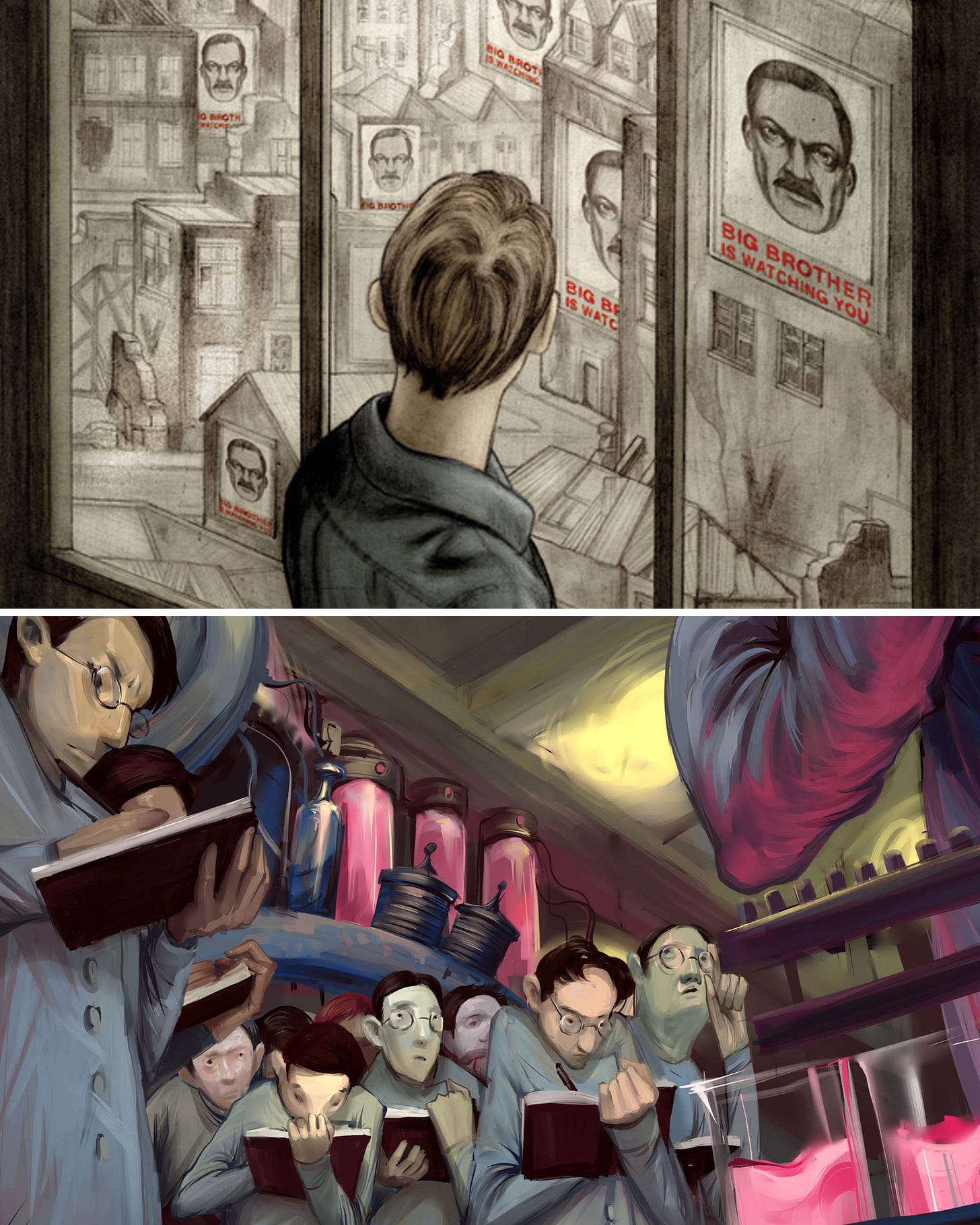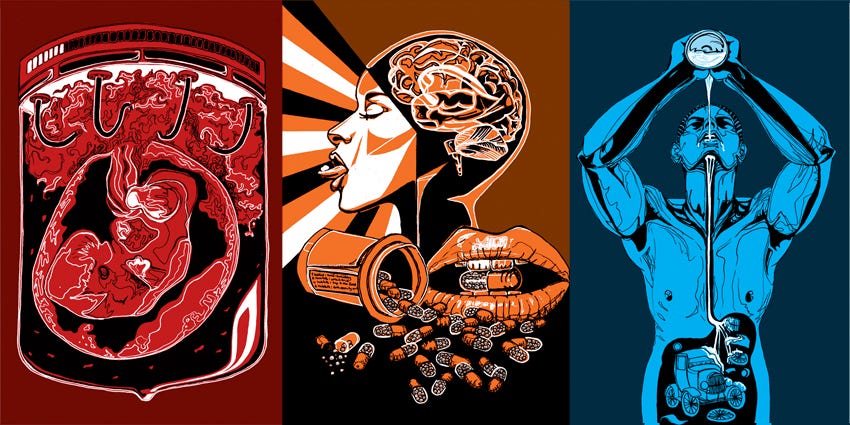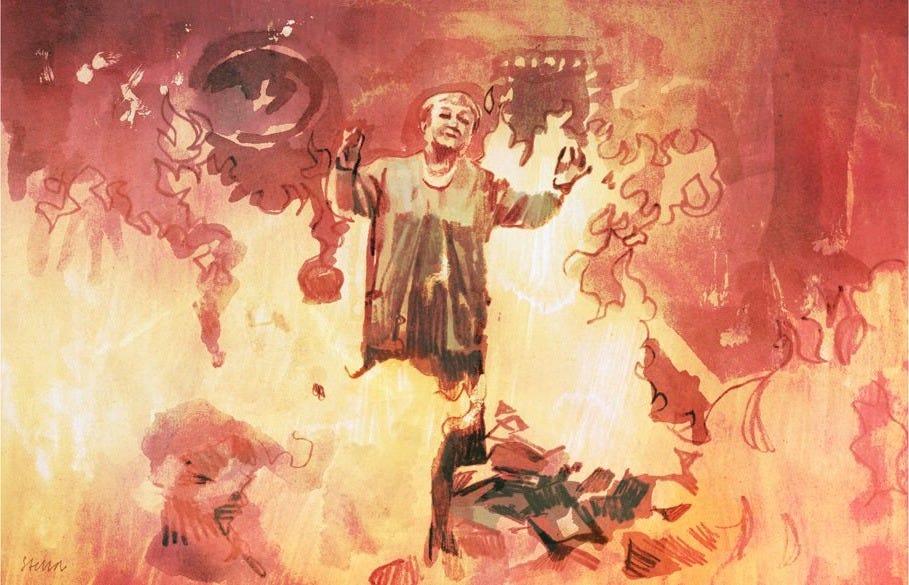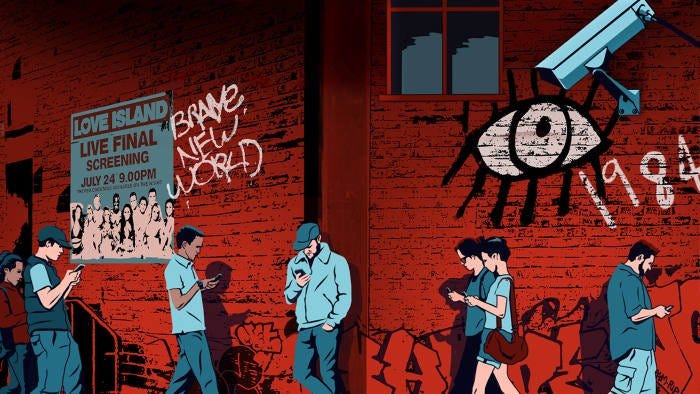“Which Dystopia Are We Living In?”

Originally posted on the author’s Substack

Dystopian literature endures because it forces us to confront uncomfortable truths about ourselves and our society.
In the English-speaking world, few works of this genre are more iconic than George Orwell’s 1984, Aldous Huxley’s Brave New World, and Ray Bradbury’s Fahrenheit 451.
Each of these novels presents a distinct vision of how the world might collapse into control, oppression, and misery — but which one feels most relevant to us today?
1984 — Oppression Through Fear
In Orwell’s Nineteen Eighty-Four, fear is the cornerstone of control. The Party, led by the enigmatic Big Brother, maintains power through surveillance, propaganda, and violence. Language is weaponized to limit thought, history is rewritten to shape the present, and dissent is crushed through brutal reeducation.
The result is a society in which individuals are stripped of autonomy, forced to live under the constant watch of telescreens and the threat of the Thought Police.

But one of the novel’s most chilling aspects is its portrayal of psychological manipulation. Through slogans like “War is Peace” and “Freedom is Slavery,” 1984 illustrates the degree to which fear and misinformation can distort reality. It warns of a world where people’s minds, as much as their physical persons, are controlled.
Yet perhaps the biggest danger of 1984 lies in the reality of how such systems can become self-perpetuating — with citizens policing themselves out of sheer terror.
Brave New World — Enslaved by Desire
Aldous Huxley’s Brave New World flips the script on oppression. Here, there is no need for fear — pleasure is a far more effective tool.
In Brave New World, citizens are conditioned from birth to seek comfort and avoid conflict. Soma, a government-supplied drug, keeps the population docile and content, while a steady stream of entertainment ensures no one has time to reflect on their lack of freedom.

Unlike 1984, where rebellion feels like a faint possibility, Brave New World is bleak because people willingly accept their oppression. They embrace it. The society’s structure ensures that critical thought, ambition, and individuality are stamped out not by force but by a seductive, numbing conformity.
In Huxley’s novel, the warning is clear — the greatest threats to freedom may come not from external forces but from within, as people trade liberty for convenience and pleasure.
Fahrenheit 451 — A World Without Books
Bradbury’s Fahrenheit 451 imagines a world where books are banned, and firemen burn them rather than extinguish fires. The novel critiques, among other things, the dangers of mass distraction and anti-intellectualism.

In some regards, it’s a hybrid of 1984 and Brave New World: while the government enforces censorship, the people themselves are complicit, preferring shallow entertainment to the discomfort of complex ideas.
Bradbury’s vision resonates in its depiction of technological addiction. Giant screens dominate homes, and interactive media replaces meaningful relationships. The protagonist, Guy Montag, discovers that his society’s decline didn’t begin with book burning, but with the public losing interest in reading.
The message is sobering — apathy can destroy freedom just as effectively as fear or pleasure.
Conclusion
All three of these famous dystopias hold up a mirror to modern society, but which feels most likely?

Orwell’s surveillance state is echoed in the rise of digital monitoring and authoritarian tendencies. Huxley’s pleasure-driven control mirrors today’s hedonism, consumerism, and obsession with comfort. Bradbury’s warnings about anti-intellectualism and distraction are eerily prescient in an age of shrinking attention spans and social media addiction.
Perhaps the most likely of these dystopias is not one, but a combination of all three — a hybrid dystopia where fear, desire, and distraction intertwine.
We’ll leave the question to you: which of these three paths is our society treading?
And is there still time to change course? Let us know your thoughts…
Follow DailyClout on Rumble! https://rumble.com/user/DailyClout
Please Support Our Sponsors
Birch Gold Group: “A Gold IRA from Birch Gold Group is the ultimate inflation hedge for your savings in uncertain times. Visit https://birchgold.com/dailyclout to see how to protect your IRA or 401(k).”
The Wellness Company: https://dailyclouthealth.com
Use code DAILYCLOUT for 10% off!
NativePath: “Electrolyte and sports drinks are doing more harm than good to your body. Stay healthy and hydrated with NativeHydrate… Visit https://nativehydrate.com/DailyClout to learn more.”
Patriot Mobile: “Visit https://patriotmobile.com/dailyclout for a FREE month of service when you switch!”
Order ‘The Pfizer Papers’ and Support Our Historic Work: https://www.amazon.com/dp/1648210376?&tag=skyhorsepub-20
Discover LegiSector! Stay up-to-date on issues you care about with LegiSector’s state-of-the-art summarizing capabilities and customizable portals. No researchers needed, no lobbyists, no spin. Legislation at your fingertips! Learn more at https://www.legisector.com/
One of our country’s most important freedoms is that of free speech.
Agree with this essay? Disagree? Join the debate by writing to DailyClout HERE.




